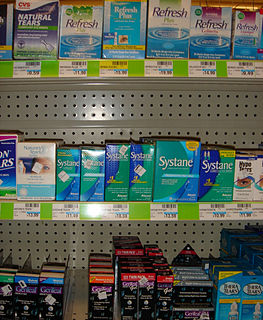 W
WArtificial tears are lubricating eye drops used to relieve dryness and irritation of the ocular surface. Dry eye syndrome is a common ocular surface disorder and is characterized by disruption of the tear film and increased inflammation.
 W
WBuprenorphine, sold under the brand name Subutex, among others, is an opioid used to treat opioid use disorder, acute pain, and chronic pain. It can be used under the tongue, in the cheek, by injection, as a skin patch, or as an implant. For opioid use disorder, it is typically started when withdrawal symptoms have begun and for the first two days of treatment under direct observation of a health care provider. The combination formulation of buprenorphine/naloxone (Suboxone) is recommended to discourage misuse by injection. Maximum pain relief is generally within an hour with effects up to 24 hours.
 W
WButorphanol is a morphinan-type synthetic agonist–antagonist opioid analgesic developed by Bristol-Myers. Butorphanol is most closely structurally related to levorphanol. Butorphanol is available as the tartrate salt in injectable, tablet, and intranasal spray formulations. The tablet form is only used in dogs, cats and horses due to low bioavailability in humans.
 W
WCarprofen, marketed under many brand names worldwide, is a nonsteroidal anti-inflammatory drug (NSAID) that veterinarians prescribe as a supportive treatment for various conditions in animals. It provides day-to-day treatment for pain and inflammation from various kinds of joint pain as well as post-operative pain. Carprofen reduces inflammation by inhibition of COX-1 and COX-2; its specificity for COX-2 varies from species to species.
 W
WPentosan polysulfate (PPS) is a medication used for interstitial cystitis and osteoarthritis. It is a semi-synthetic polysulfated xylan.
 W
WCefovecin (INN) is an antibiotic of the cephalosporin class, licensed for the treatment of skin infections in cats and dogs. It is marketed by Zoetis under the trade name Convenia. It is used to treat skin infections caused by Pasteurella multocida in cats, and Staphylococcus intermedius and Streptococcus canis in dogs. The advantage of using a long-acting injectable antibiotic is that, unlike with daily administration, doses cannot be missed, which may allow partially resistant microbes to recover. The disadvantage is the presence of subtherapeutic concentrations in the weeks after the resolution of infections. This is associated with the development of resistance in microbes. It should not be used in pregnant or lactating animals or in animals with a history of allergies to penicillin or cephalosporin drugs.
 W
WDeracoxib is a nonsteroidal anti-inflammatory drug (NSAID) of the coxib class, used in dogs to treat pain associated with osteoarthritis, or to prevent pain following orthopedic or dental surgery. It is available as beef-flavored tablets.
 W
WDirlotapide is a drug used to treat obesity in dogs. It is manufactured by Pfizer and Zoetis and marketed under the brand name Slentrol.
 W
WFirocoxib is a nonsteroidal anti-inflammatory drug of the COX-2 inhibitor (coxib) class, currently approved for use in dogs and horses. Firocoxib was the first COX-2 inhibitor approved by the U.S. Food and Drug Administration for horses. Firocoxib is not intended or approved for use in human medicine.
 W
WLufenuron is the active ingredient in the veterinary flea control medication program, and one of the two active ingredients in the flea, heartworm, ringworm and anthelmintic medicine milbemycin oxime/lufenuron (Sentinel).
 W
WMaropitant (INN; trade name: Cerenia sə-REE-nee-ə), used as maropitant citrate (USAN), is a neurokinin-1 (NK1) receptor antagonist which was developed by Zoetis specifically for the treatment of motion sickness and vomiting in dogs. It was approved by the FDA in 2007 for use in dogs and in 2012 for cats.
 W
WMeloxicam, sold under the brand name Mobic among others, is a nonsteroidal anti-inflammatory drug (NSAID) used to treat pain and inflammation in rheumatic diseases and osteoarthritis. It is used by mouth or by injection into a vein. It is recommended that it be used for as short a period as possible and at a low dose.
 W
WNitenpyram is a chemical frequently used as an insecticide in agriculture and veterinary medicine. The compound is an insect neurotoxin belonging to the class of neonicotinoids which works by blocking neural signaling of the central nervous system. It does so by binding irreversibly to the nicotinic acetylcholine receptor (nACHr) causing a stop of the flow of ions in the postsynaptic membrane of neurons leading to paralysis and death. Nitenpyram is highly selective towards the variation of the nACHr which insects possess, and has seen extensive use in targeted, insecticide applications.
 W
WOrbifloxacin is a fluoroquinolone antibiotic which is approved for use in dogs, marketed by Schering-Plough Animal Health.
 W
WOsaterone acetate, sold under the brand name Ypozane, is a medication which is used in veterinary medicine in Europe in the treatment of enlarged prostate in dogs. It is given by mouth.
 W
WPimobendan is a veterinary medication. It is a calcium sensitizer and a selective inhibitor of phosphodiesterase 3 (PDE3) with positive inotropic and vasodilator effects.
 W
WMetaflumizone is a semicarbazone insecticide indicated for the veterinary treatment of fleas and ticks, marketed under the brand name ProMeris. A discontinued variant of ProMeris, called ProMeris Duo or Promeris for Dogs, was indicated for canine use and was a formulated blend of metaflumizone and amitraz. The metaflumizone-only formulation is waterproof and typically remain effective for 30–45 days in a cutaneous application at the base of the neck.
 W
WMetaflumizone is a semicarbazone insecticide indicated for the veterinary treatment of fleas and ticks, marketed under the brand name ProMeris. A discontinued variant of ProMeris, called ProMeris Duo or Promeris for Dogs, was indicated for canine use and was a formulated blend of metaflumizone and amitraz. The metaflumizone-only formulation is waterproof and typically remain effective for 30–45 days in a cutaneous application at the base of the neck.
 W
WSelamectin is a topical parasiticide and anthelminthic used on dogs and cats. It treats and prevents infections of heartworms, fleas, ear mites, sarcoptic mange (scabies), and certain types of ticks in dogs, and prevents heartworms, fleas, ear mites, hookworms, and roundworms in cats. It is structurally related to ivermectin and milbemycin. Selamectin is not approved for human use.
 W
WTepoxalin, marketed under the brand name Zubrin among many others, is a non-steroidal anti-flammatory drug (NSAIDs) generally used in veterinary medicine to reduce swelling in animals with osteoarthritis. In rare circumstances, Tepoxalin can also be used in human pharmacology to relieve pain caused by musculoskeletal conditions such as arthritis and hip dysplasia.
 W
WToceranib is a receptor tyrosine kinase inhibitor and is used in the treatment of canine mast cell tumor also called mastocytoma. Together with masitinib, toceranib is the only dog-specific anti-cancer drug approved by the U.S. Food and Drug Administration. It is marketed as Palladia as its phosphate salt, toceranib phosphate (INN) by Pfizer. It was developed by SUGEN as SU11654, a sister compound to sunitinib, which was later approved for human therapies. Toceranib is likely to act mostly through inhibition of the kit tyrosine kinase, though it may also have an anti-angiogenic effect.